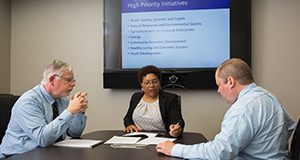Regardless of workspace or class setting, group work has gotten a reputation for being less than pleasant. However, when individuals have the opportunity to prepare for group work via understanding their personal strengths, expectations, and perspectives, the not-so-popular group work can often turn into pleasant, productive, and collaborative engagement. Because group dynamics shift and vary from group to group, there is a constant learning opportunity to understand how to work in groups successfully. This new 2-page publication of the UF/IFAS Department of Agricultural Education and Communication will identify simple yet effective strategies that can serve as foundational building blocks whenever preparing oneself or others for group work. Written by Cecilia E. Suarez and Jarred A. Shellhouse.
https://edis.ifas.ufl.edu/wc389
Tag: Jarred A. Shellhouse
Don’t Fake It, Make It! Best Practices for Attending Virtual Events
Continuing the Don’t Fake It, Make It! series to make the most out of virtual conferences and meetings, this fact sheet provides tips specific to attendees. Up to this point, the series has focused largely on the process a host should go through before launching a virtual event. This new 4-page publication of the UF/IFAS Department of Agricultural Education and Communication shifts the focus from virtual host to virtual participant to allow attendees of the virtual event to get the most out of the experience. While the spotlight is on attending virtual conferences in particular, the suggestions included can translate to other virtual meeting spaces. Written by Jarred A. Shellhouse and Lauri M. Baker.
https://edis.ifas.ufl.edu/wc373
Enhancing Motivation through Work Meaningfulness
Work meaningfulness is described as the amount of significance an employee perceives in their work. Employees who view their work as meaningful demonstrate higher work motivation, performance, and satisfaction than employees who do not. This new 2-page document discusses ways to change the perception of meaningful work. Written by Jarred A. Shellhouse, Hannah S. Carter, and Matt P. Benge, and published by the UF/IFAS Department of Agricultural Education and Communication, February 2019.
http://edis.ifas.ufl.edu/wc330


